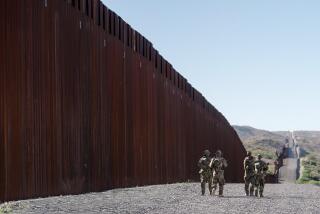COLUMN LEFT : Beastliness It Was, but With a Logic : Hostage-taking was the only weapon available against U.S. machinations in the Middle East.
At any given time there are plenty of people being held as hostages somewhere in the world, and Americans give them no thought. America’s obsession with American hostages began on Nov. 4, 1979. On that day Iranian students took over the U.S. Embassy in Tehran, imprisoning the diplomatic staff resident there at the time.
There was a torrent of moralizing here about Islamic beastliness and contravention of civilized norms, but the motives for the hostage-taking were coherent and in response to American actions. President Jimmy Carter had just admitted a cherished U.S. ally, the exiled Shah of Iran, to the United States. Simultaneously, the administration was doing everything in its power to destabilize and if possible overthrow the Khomeini government, which had replaced the shah.
In the eyes of the perpetrators and their sympathizers, the hostage-taking was a successful tactic, leading directly to the defeat of Carter and the inauguration of the Reagan team which swiftly sanctioned arms shipments, via Israel, to Tehran.
In early 1982, Secretary of State Alexander M. Haig gave an explicit go-ahead to an Israeli invasion of Lebanon that took place that June. The ensuing carnage claimed many thousands of Lebanese and Palestinian lives. A year later, as Israel began to fall back behind its southern perimeter of Lebanese territory held by its Lebanese proxies, National Security Adviser Robert C. McFarlane urged an enhanced American presence in the terrain vacated by Israel. By September, 1983, the battleship New Jersey was shelling Druze villages behind Beirut.
These exhibitions of American partiality had two immediate consequences. One was the bombing of the Marine barracks at Beirut airport, causing the death of 241 Marines. The second was the kidnappings, which began a year later.
The moral here is that deeds have consequences and those who would moralize about the vileness of kidnaping and kindred terrorism conveniently ignore the other side of the moral equation.
The men who held Terry Anderson and the others in manacles, behind blindfolds, for years on end behaved barbarously. But to their captives, they pointed at the barbarity of Israel, whose soldiers and proxies had kidnaped hundreds and held them in the dungeons and torture boxes of Khiam in southern Lebanon, and which has seized and held without charge thousands upon thousands of Palestinians.
People will fight with the weapons available to them. McFarlane sent in the Marines and the New Jersey. The Hezbollah responded with kidnaping. There never was any moral symmetry here. Between them, Israel and the United States held an overwhelming lead in the exercise of violence and terror.
The durance of Anderson and the other victims always had great vividness. As is proper, they were never forgotten. But somehow the resonance of words like kidnaping or hostage loses force when U.S. nationals are not the victims, or when the United States is indulging in the same sort of activity itself. What is George Bush doing, if not holding millions of innocent Iraqis hostage and on the edge of starvation under the embargo?
“That’s different,” say the self-righteous, but it’s not different at all, just worse. What’s different is the purblind arrogance and obliquity of these Westerners perched on their one-way moral conveyor belts.
On Saturday comes the 50th anniversary of Pearl Harbor, and the press is full of discussion of whether Japan should apologize. Apologies for Hiroshima and Nagasaki are deemed out of order.
This season brings another anniversary, about which remarkably little has been heard. It’s generally reckoned that U.S. intervention in Vietnam began on Dec. 11, 1961, when, under the orders of President John F. Kennedy, two helicopter companies of 36 Shawnee helicopters, and 370 officers and men of the U.S. Army, together with seven T-28 trainer-combat planes, landed in Saigon.
In fact, the United States had already been unofficially involved for several years, but 1961 was when the descent into the vortex began in earnest. Fourteen years later, the United States withdrew, leaving behind three destroyed countries and about 2 million dead. Apologies? How can you apologize when you refuse to admit you did anything wrong, and when to this very day the United States continues--against the pleading of its allies--to impose economic sanctions on Vietnam and to hold millions of Vietnamese hostage to the enduring American need for revenge. How lightly weigh the Hezbollah’s kidnapings on scales such as these.
More to Read
Start your day right
Sign up for Essential California for news, features and recommendations from the L.A. Times and beyond in your inbox six days a week.
You may occasionally receive promotional content from the Los Angeles Times.






